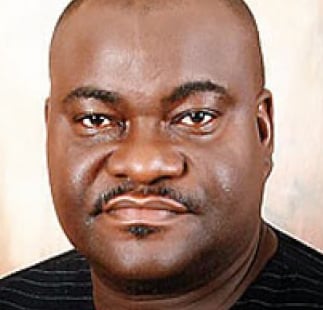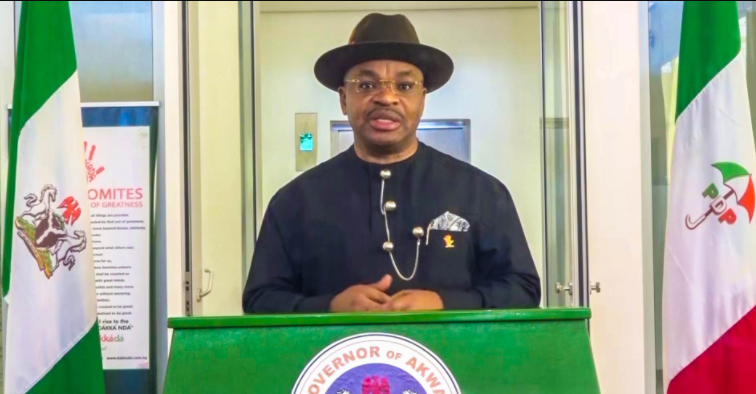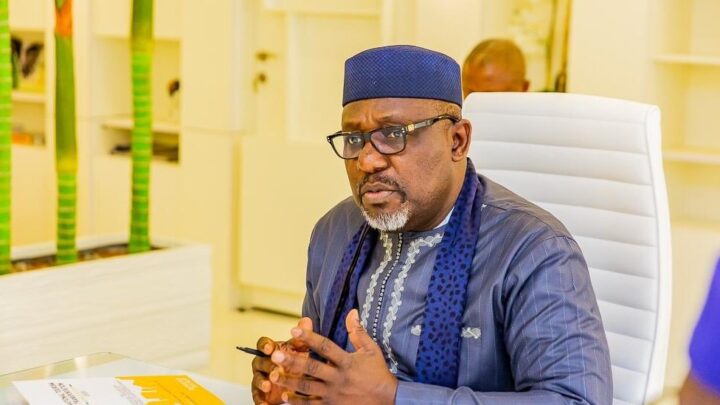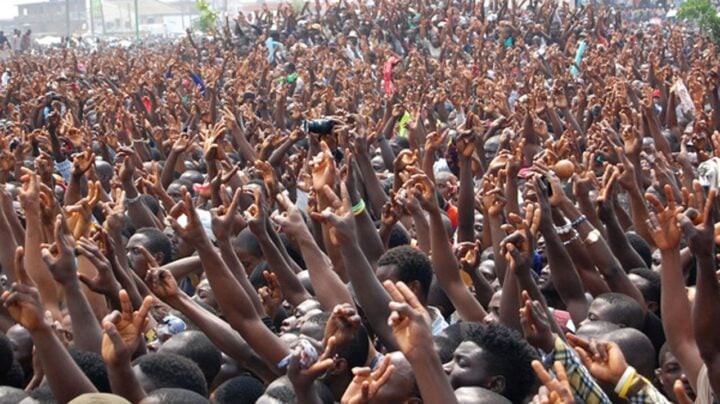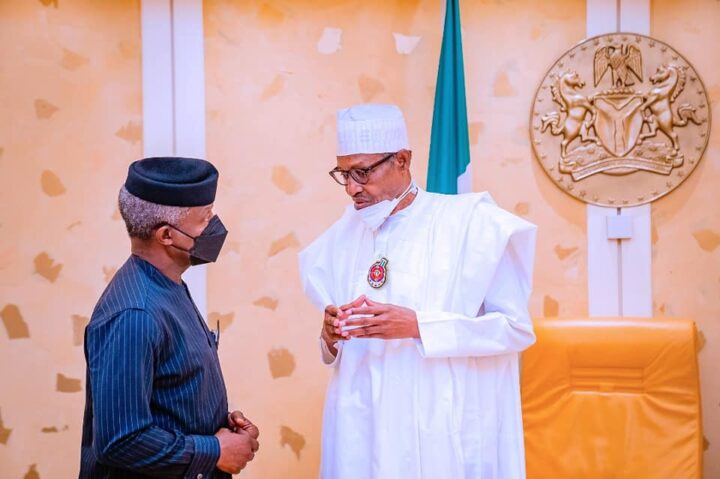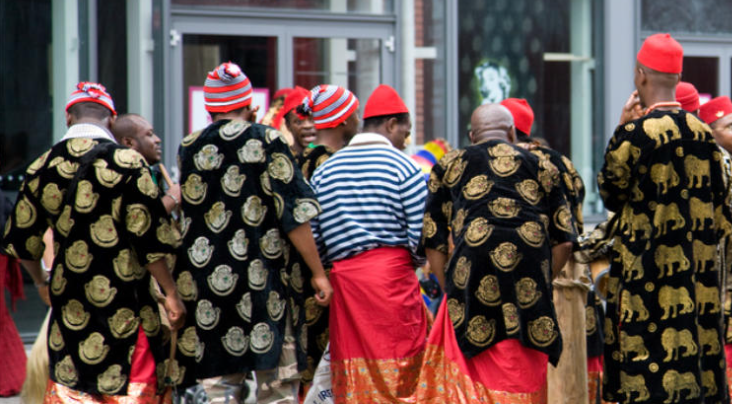Udom Gabriel Emmanuel, governor of Akwa Ibom state, is an amiable and genial personality. There is this debonair cosmopolitanism and charisma about his makeup that is bound to strike you. A “Lagos boy” (he studied accounting at the University of Lagos (Unilag)) and I understand he speaks some Yoruba, Udom spent a substantial chunk of his working career in the nation’s socio-economic hub. He came into his job as chief executive of his state, against the backdrop of a very impressive resume. This is much unlike some of his colleagues who parade vacuous, dodgy, actually suspect curricula vitae.
Emmanuel, a chartered accountant, trained with Price Water House Coopers and worked with Diamond Bank of Nigeria Plc. He was subsequently engaged by Zenith Bank of Nigeria Plc, rising to the position of executive director. He served as secretary to the state government (SSG), in his state for two years, 2013 to 2015, which in some manner, helped to “onboard” him into his position as the number one citizen of Akwa Ibom state.
I’ve met Udom Emmanuel on two occasions and he never disappointed as a welcoming, classy host. A few years ago, while in Abuja, Udom called a friend of mine, to meet up with him, to discuss something of mutual importance. The call came when Tivlumun Nyitse and I were with that friend, typically bouncing ideas and building scenarios, about the national question. The friend insisted we accompany him to see Emmanuel, at the Akwa Ibom governor’s lodge in Asokoro, Abuja. He had a subsisting relationship with the governor and reckoned the latter would be pleased to meet us. Emmanuel was in the company of the likable Gabriel Suswam, former governor of Benue state, now a senator. He was a good host, even as he challenged us to “retaliate” our visit by coming to Uyo, his own territory!
Later that year, Emmanuel invited my friend to the annual Akwa Ibom Night of Carols held at the Uyo Township Stadium. He requested he came along with Nyitse and me. He beckoned to our triumvirate to join him and his other distinguished guests, including Peter Obi, former governor of Anambra state, at what was an extremely late dinner or an unusually early breakfast at about 3am that day straight from the venue of the carol service. He tried to prevail on us to spend Christmas with him, with barely 48 hours to the yuletide. We collectively declined, opting to return to be with our families. Emmanuel is truly a nice guy.
Advertisement
Emmanuel’s public perception has been generally positive. He succeeded Godswill Akpabio, now minister of the Niger Delta ministry, who was generally applauded for prosecuting the massive infrastructural facelift of the state, and took off from where his predecessor stopped. Akpabio was described as one governor who pursued the “uncommon transformation” of the state. It is to Emmanuel’s credit that Akwa Ibom is perhaps the most peaceful and secure state in the country. His administration has equally striven to boost the industrialisation of the state by encouraging the establishment of sustainable ventures and enterprises, to mitigate unemployment in the state and impact the local economy. Akwa Ibom, today, boasts of industries producing an assortment of products like plastics, syringes, tissue paper, toothpicks, petrochemicals, ceramics, coconut, and cassava among others.
The decision of the Emmanuel administration to embark on the construction of the ongoing Ibom deep seaport, while also floating the Ibom Airline reputed to parade the newest fleet of aircraft in the local aviation sector, is part of efforts to make Akwa Ibom state the foremost destination for business and investment. The government is equally building an ultra-modern international terminal at the Victor Atta Airport Uyo, to open the doors of the state to the international community. In the educational sector, Emmanuel’s regime is said to have recruited about 2,000 school teachers, to temper unemployment among the youthful population of the state. The government has also built or remodeled classrooms and institutions across the state. To secure students and equipment in some educational institutions, the Udom government has constructed perimeter fences around many schools.
Last September, Vice President Yemi Osinbajo commissioned what perhaps, presently ranks as the tallest multi-storey building in Nigeria, the 21-storey Dakkada Towers, in Uyo, built by the Emmanuel dispensation. The building is designed to provide international standard office accommodation for Nigerian concerns and multinationals who may choose to do business in the state. On the same day, September 25, 2021, Osinbajo equally commissioned the 577-unit Dakkada Luxury Estate, also built by the Emmanuel government, a complement to the futuristic agenda to lure the world to invest in, and also reside in Uyo. Emmanuel elicited plaudits from the vice president on that occasion.
Advertisement
Last week, Emmanuel stirred the proverbial hornet’s nest, no thanks to a controversial public declaration he made. How he manages this development, in the following weeks and months, will be key to how history represents him and how his people relate with him after office. At a meeting of leaders and stakeholders of the Peoples’ Democratic Party (PDP), Akwa Ibom state chapter, one of Emmanuel’s predecessors, Victor Atta, presented Umo Eno, the incumbent commissioner for lands and water resources, as the successor-in-waiting to Emmanuel. Photographs would subsequently surface in the social media of Eno kneeling before Emmanuel in what was supposed to be his formal “anointing”. That decision has been backlashed in political circles in the state.
Party bigwigs, national assembly members, statesmen, and others, have been unanimous in condemning what they consider a monumentally wrong-headed ambush by Atta and Emmanuel which could impact the historical unity, cohesion, and oneness, which have characterised the politics of PDP in the state. Since the advent of democracy nearly 24 years ago through the regimes of Atta, Akpabio, and Emmanuel, Akwa Ibom has remained consistently a bastion of the PDP. Not even the tantrums of the All Progressives Congress (APC), which deployed all manner of scarecrow tactics to tilt the 2019 elections, shook the PDP one bit. Indeed, Akpabio who has long defected to the APC and contested for a second term in the senate on the platform of the APC was comprehensively flattened by the PDP at the polls.
It has become commonplace since the return of popular governance in 1999 for top political actors holding executive offices to attempt to handpick their successors, with a view to installing puppets and tomboys. The intention is to enthrone stooges who will watch their backs and clean up their dirty tracks. Sadly, this has not always worked. Umaru Yar’Adua opted to be his own man after former president Olusegun Obasanjo ordained him his successor in 2007. Chimaroke Nnamani of Enugu state found it daunting to zombify Sullivan Chime, his successor, not forgetting the combustible fallout of the relationship between Adams Oshiomhole, former Edo state governor, and his successor, Godwin Obaseki.
Indeed, Emmanuel is a poor student of contemporary political history. Flashback to 2006 in the same Akwa Ibom, the very same Victor Atta attempted to foist his son-in-law, Bob Ekarika, on the state as his successor. Spontaneous opposition to that attempt profited Akpabio, who was preferred by stakeholders. Not too far away in Imo state, Rochas Okorocha’s attempt to be reincarnated through his son-in-law, Uche Nwosu, during the 2019 governorship election culminated in a historic fiasco.
Advertisement
Emmanuel should ask Suswam, his good friend who also tried to enthrone Terhemen Tazoor as the PDP governorship candidate ahead of the 2015 election. That attempt collapsed like those ever-crashing, badly-conceived Lagos high-rise buildings. Samuel Ortom, who participated in the primaries which produced Tazoor, was promptly baited by the APC in Benue and supported by the electorate to clinch the top job in the state. Muhammadu Buhari, Nigeria’s president, cracked a joke, that he wouldn’t name his successor as yet, so he or she is not killed before time!
In a milieu where there are concerted efforts to rejig our democratic processes to engender level playing fields at all elective political strata and to foster fairness, equity, and justice, Emmanuel should not be a party to an arrangement that privileges a particular individual over and above the collective disenfranchisement of others. Emmanuel’s party, the PDP, once upon a time exemplified superfluous politicking where tickets to elective positions were dispensed to “anointed” candidates on the orders of Aso Villa in concert with “Wadata House”, the national headquarters of the PDP in Abuja.
The PDP has new leadership in place led by the respectable scholar, administrator, and politician, Iyorchia Ayu, which is striving to rebrand the party. Ahead of the recent gubernatorial primaries in Ekiti state, the Ayu-led national working committee (NWC) of the PDP was courageous enough to cancel the much-criticised, heavily lampooned process, which produced ad hoc delegates, who were to vote at the primaries. The PDP must demonstrate more grit, muscle, and greater resolve to bury the monsters of the past which were collectively responsible for the decimation of the party in 2015. They need not bemoan the government magic which brazenly altered the true and factual electoral tally in 2019, including the sudden evaporation of the electronic server which aggregated results from every polling unit in the country, in an election so glaringly won by the PDP any further.
With the pervading hunger, anger, despair, disappointment, disillusionment in the air today, the 2023 election is PDP’s to lose. The party must move speedily however to clobber and crush its many ogres, including the excesses of its gloating governors who conduct themselves with unrivaled pharaonic arrogance. Emmanuel and his colleagues must be reined in. They must subject themselves to the supremacy of the constitution of their party. The PDP, which still parades some of Nigeria’s brightest and best, who are regularly being poached by the APC must reclaim its pre-eminence in national politics in the nation’s interest.
Advertisement
Olusunle (PhD) a poet, journalist, scholar, and author, is a member of the Nigerian Guild of Editors, (NGE)
Advertisement
Views expressed by contributors are strictly personal and not of TheCable.
Add a comment
